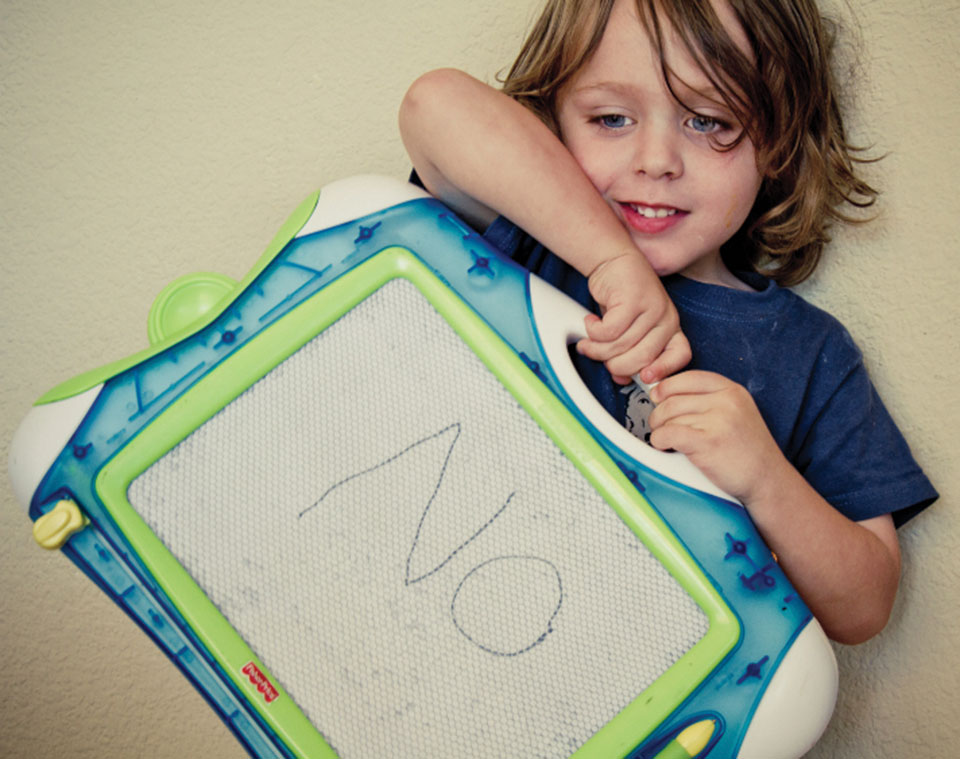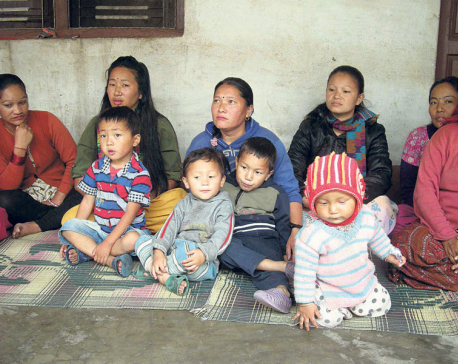
OR
How to talk about consent with your child?
Published On: October 27, 2018 12:15 AM NPT By: Usha Pokharel


Usha Pokharel
Usha Pokharel is an educationist and author of several children’s books.usha@pokharel.net
Teaching children about consent starts early by modeling consent even when dressing your child or picking them up.
One day I got a phone call from a reporter. She wanted my comments about talking to young children about rape. That got me thinking. Being associated with institutions dealing with the rehabilitation of child rape victims, I always felt the need to make parents aware of techniques to deal with the topic of rape with their children.
Considering the number of rape cases reported in newspapers lately, I think it is about time for parents to take this issue seriously. You cannot get away thinking, ‘it cannot/ will not happen to my child!’ Well parents, I ask you, ‘what have you done to make sure of that?’ Stumped you, didn’t I? Don’t feel so confident unless you have taken up some measures. No, establishing strict house rules and curfew for girls won’t work. It can happen to anyone. No, I am not trying to scare you, just emphasizing on the importance of knowing how to go about dealing with the reality of the situation.
I came back from the USA recently. There I had an opportunity to observe an interaction of mother and an 18-month-old daughter. The mother wanted to try some dresses to see if they fit her daughter. To my surprise, her daughter did not allow her clothes to be removed. She kept saying ‘no’ and the mother respected her decision. After explaining a bit she allowed to have her dress changed. That was the first step toward building children’s confidence to say ‘no’ and mean it too.
Value of consent
I was surprised that she was also learning about parts of her body in her day care and at home that early. I was amazed to see to how quickly she had learned to say ‘no’. Actually that is the first step toward teaching children the value of consent. Parents, please don’t think, ‘my child is too small, so does not have to learn about it just yet, may be later when she grows up, someone will talk to her about it’. No, you cannot get way with that. By the time someone will talk about it, s/he might already be molested or even raped. Who knows!! If you ask me, ‘what I will teach my son/daughter? I’ll say teach him/her that consent means “yes.”
I know you are feeling uncomfortable just thinking about talking to your children about ‘sex’, ‘rape’ and everything associated with it. But you need to start talking to your children about these issues before it is too late. I understand your dilemma. No one talked to you about it. Sex was a taboo at home while you were growing up. Hence you are not comfortable talking about it either. Rape is a very difficult topic to talk about to young children. I am going to make things a bit easier for you. You can start by talking about ‘consent’ to them. I can see a few relieved faces. This is the first step toward understanding ‘rape’.
Teaching children about consent starts early by modeling consent even when dressing your child or picking them up. It’s always a good idea to start by asking your toddler, ‘Can I pick you up?’ and wait for them to respond either with body language or words. If they say ‘no’ then ‘no’ it is, till they are convinced and respond with a ‘yes’. Never force them according to your wishes. They need to understand that ‘no’ means ‘no’ and that they should respect it to. This will also make your life easier.
Similarly, before helping your child get dressed, ask, “Can I take off your pants or frock?” And wait for consent. If they say no, but you have to get them dressed anyway, explain to them what you are going to do and why. For example, tell them, “We have to go to the store so you have to wear clothes, because you cannot do it by yourself, I have to help you do it.” Put the focus on helping.
Also teach them about ‘good touch’ and ‘bad touch’. A four-year-old will understand well and differentiate between ‘good touch and a ‘bad touch’. Touching also requires consent. ‘Can I hug you?’ If they do not like they will definitely respond with a ‘no’. Respect their decision because they do not trust the person you are asking to hug. Of course this will change when child feels comfortable about the person a little later. The trick is not to force your child, if s/he does not want to interact with your guest. Forcing will give a bad message. The boys will start believing that forcing someone to submission is okay. Respect your child’s decision if s/he says ‘no’.
What parents should do?
It’s important for the parents to teach children that their voice is important and is heard at home as well and that ‘no’ means ‘no’. Educating young children about their body parts is also very important. At the same time they also need to learn that their private parts are for them and off limits to others. Their body belongs to them! Hence, they get to choose who touches their body and how and where they touch them. This is a very important part of educating your child.
While playing games that touch each other like tickling or wrestling, stop frequently and ask for consent, ‘is it ok’? If your child says, ‘no’ respect their decision and stop immediately. Your intention is to teach your children to ask their friends consent when they are playing together and if the other person says ‘no’ or ‘stop’, respect their friend’s response and stop.
Dealing with older children might require a bit more effort. It is necessary for parents to understand the complexities of the topic they are dealing with. First you need to make it clear what ‘rape’ is in the first place, and for that you need to explain to them what ‘consent’ is, because rape is all about consent. Just keep in mind that any discussion regarding consent has to be taken outside the sexual arena first to make it more effective.
Asking open-ended questions like, ‘Do you understand what consent is and what consent means to you? Do you understand how others will understand consent?’ will help start the conversation. Also consider asking, ‘When your ideas of consent don’t line up with someone else’s ideas of consent, how do you handle that?’ Don’t forget to include, ‘Do you understand how important it is that all people involved make sure everyone consents to a situation?’ in your arsenal of questions for your children.
These are just the starters. You can devise your own questions too, depending on your child’s level of understanding. Believe me they will highly appreciate your getting into this role of explaining difficult concepts. Learning about ‘consent’ is important for both boys and girls.
Rape is all about boys not understanding the value of consent and forcing girls to submission. Boys also need to broaden their understanding of consent and body privacy, and the need for permission for both boys and girls. They need to know that they have the right to not be touched or intruded upon too. If your child has a sense that they have that right, then emphasize upon the fact that they also must extend that right to others.
I understand it is a bit awkward for you to talk about it, then again who will do the talking, if not you? You have your child’s safety in mind, someone else might not; you need to understand that fact, gather up your courage and talk to your children about rape, consent and earn versus take situations. If you do it gradually it will be less awkward. Both parents need to be involved in disseminating information regarding this topic. Fathers can help with their sons and mothers with their daughters. Another thing to keep in mind is to talk about consent to children very often and openly so that asking for “consent” doesn’t seem like something “weird or unusual.” Now that is not very difficult, right parents?
Pokharel is an educationist and author of several children’s books
usha@pokharel.net
You May Like This

PM can use helicopter after prior consent of the election body
KATHMANDU, Aug 31: The Election Commission (EC) has barred the ministers and public position holders from using state-owned helicopters in government... Read More...

Two children burnt to death
BAGLUNG, Feb 6: Two siblings died on Monday when a cow shed caught fire in Bagaha of Adhikarichaur-3 of the... Read More...

Children of inmate mothers deprived of education
KHOTANG, Sept 13: Instead of going to school, five-year-old Mausam Rai of Mauwabote-6 in Khotang district has been spending life in... Read More...




Just In
- District Court Rautahat sentences four individuals including Aftab Alam to life imprisonment
- Class 12 exam starts today with participation of over 390,000 candidates
- Weather expected to be partially cloudy in hilly areas, clear in remaining areas
- Navigating the Digital Diplomacy Divide: Balancing Tradition and Technology in Global Relations
- Youth attempts suicide amid police torture over Facebook comments against home minister
- Time to declare EVMs’ end
- World Malaria Day: Foreign returnees more susceptible to the vector-borne disease
- MoEST seeks EC’s help in identifying teachers linked to political parties













Leave A Comment